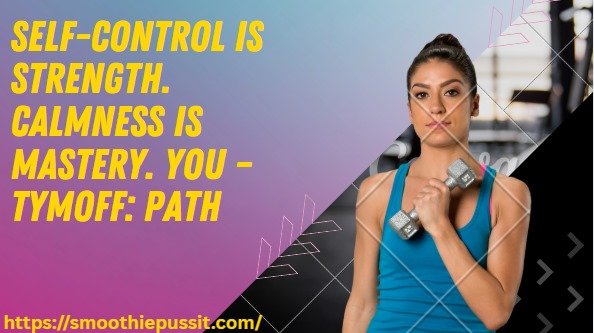In a world marked by chaos and distractions, maintaining control over one’s emotions is a true asset. The phrase “Self-control is strength. Calmness is mastery. You – Tymoff” captures this essence of internal balance and empowerment. Understanding this quote reveals profound truths about personal growth, emotional intelligence, and mental resilience.
Understanding the Core Message
The quote speaks to the internal disciplines that define strong individuals. While outward success is often admired, it is the inner mastery over reactions and impulses that builds unshakeable character. Let’s break down each part.
Self-Control Is Strength
Strength is not solely measured by physical power. Rather, the ability to remain composed in moments of temptation or provocation is where real strength lies. Self-control involves resisting immediate urges for long-term gain. When one chooses patience over anger or restraint over indulgence, a powerful transformation occurs.
Moreover, self-discipline fosters clarity and purpose. Leaders, creatives, and achievers often attribute success to their ability to remain focused despite distractions. This act of deliberate restraint reflects resilience and maturity.
Calmness Is Mastery
True mastery is not control over others but over oneself. Calmness in the face of adversity reflects emotional depth and awareness. It is not indifference but a conscious choice to respond, not react. Individuals who stay calm amid chaos often possess advanced emotional intelligence.
Furthermore, calmness promotes better decision-making. When emotions are balanced, one can assess situations with objectivity. In contrast, reactive behavior often leads to regret. Thus, by mastering calmness, a person gains command over outcomes.
You – Tymoff
The inclusion of “You” in the quote personalizes the message. It implies that the strength and mastery lie within you, not in external validation. Tymoff’s framing encourages self-reflection and accountability. It is a gentle reminder that the power to control your inner world resides in your own hands.
Rather than seeking control outwardly, embracing this mindset channels focus inward—toward becoming a person of composure, awareness, and purpose.
Why This Philosophy Matters in Daily Life
In everyday life, stressors abound. Work pressures, personal conflicts, and societal expectations challenge our mental peace. By practicing self-control, one can prevent impulsive decisions. Additionally, staying calm during tense situations minimizes damage and maintains relationships.
This philosophy also fosters mindfulness. Living intentionally and mindfully reduces anxiety. It creates space to think clearly, act wisely, and live meaningfully. Instead of being a slave to emotions, one becomes the master of their destiny.
Practical Ways to Build Self-Control and Calmness
1. Mindful Breathing
Practicing deep breathing techniques helps activate the parasympathetic nervous system. This regulates emotions and promotes calm responses during stress.
2. Journaling
Writing down emotions allows for healthy expression and provides insight into recurring triggers. Recognizing patterns is the first step toward mastery.
3. Delayed Response
Instead of reacting instantly, take a moment to pause. This habit encourages thoughtful responses and builds emotional restraint over time.
4. Setting Boundaries
Knowing your limits helps protect your peace. Saying “no” when necessary is a powerful act of self-control.
5. Regular Reflection
Spending a few minutes each day reflecting on behavior and reactions enhances self-awareness. Over time, this nurtures both control and calmness.
The Inner Battle Is the Real Battlefield
External challenges are temporary, but the battles within are ongoing. Choosing calm over conflict and restraint over reaction consistently requires effort. However, the rewards—mental clarity, stronger relationships, and inner peace—are well worth it.
As Tymoff’s quote suggests, the path to mastery is not found in the noise of the world but in the silence of one’s own mind. Cultivating self-control and calmness sets the foundation for a purposeful, empowered life.
Conclusion
The quote Sself-control is strength. calmness is mastery. you – tymoff.holds timeless wisdom. It speaks directly to the importance of inner strength in an often unpredictable world. By internalizing this philosophy, anyone can begin the journey toward greater emotional intelligence, clarity, and peace.
